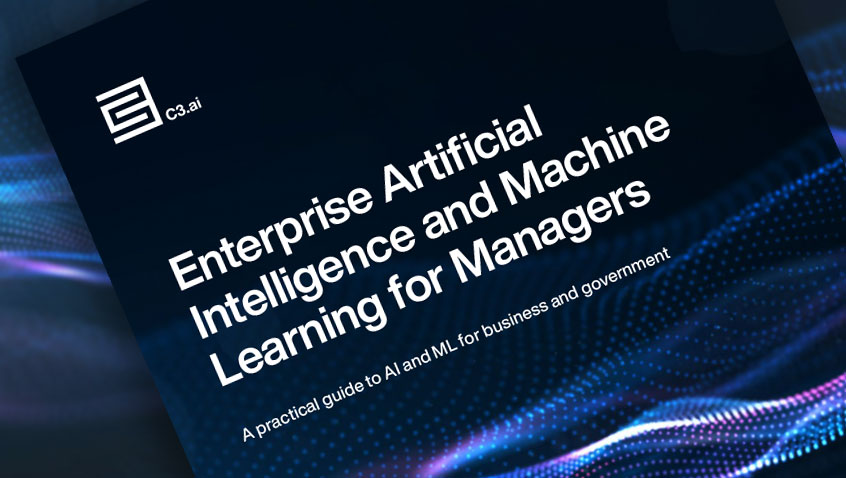- AI Software
- C3 AI Applications
- C3 AI Applications Overview
- C3 AI Anti-Money Laundering
- C3 AI Cash Management
- C3 AI Contested Logistics
- C3 AI CRM
- C3 AI Decision Advantage
- C3 AI Demand Forecasting
- C3 AI Energy Management
- C3 AI ESG
- C3 AI Health
- C3 AI Intelligence Analysis
- C3 AI Inventory Optimization
- C3 AI Process Optimization
- C3 AI Production Schedule Optimization
- C3 AI Property Appraisal
- C3 AI Readiness
- C3 AI Reliability
- C3 AI Smart Lending
- C3 AI Supply Network Risk – bak
- C3 AI Turnaround Optimization
- C3 Generative AI Constituent Services
- C3 Law Enforcement
- C3 Agentic AI Platform
- C3 Generative AI
- Get Started with a C3 AI Pilot
- Industries
- Customers
- Events
- Resources
- Generative AI for Business
- Generative AI for Business
- C3 Generative AI: How Is It Unique?
- Reimagining the Enterprise with AI
- What To Consider When Using Generative AI
- Why Generative AI Is ‘Like the Internet Circa 1996’
- Can the Generative AI Hallucination Problem be Overcome?
- Transforming Healthcare Operations with Generative AI
- Data Avalanche to Strategic Advantage: Generative AI in Supply Chains
- Supply Chains for a Dangerous World: ‘Flexible, Resilient, Powered by AI’
- LLMs Pose Major Security Risks, Serving As ‘Attack Vectors’
- What Is Enterprise AI?
- Machine Learning
- Introduction
- What is Machine Learning?
- Tuning a Machine Learning Model
- Evaluating Model Performance
- Runtimes and Compute Requirements
- Selecting the Right AI/ML Problems
- Best Practices in Prototyping
- Best Practices in Ongoing Operations
- Building a Strong Team
- About the Author
- References
- Download eBook
- All Resources
- Publications
- Customer Viewpoints
- Blog
- Glossary
- Developer Portal
- Generative AI for Business
- News
- Company
- Contact Us
Glossary
- Artificial Intelligence
- AI Agents
- AI in Finance
- AI in Manufacturing
- Anomaly Detection
- Anti-Money Laundering
- Asset Performance Management
- Asset Reliability
- Demand Forecasting
- Digital Disruption
- Digital Transformation
- Digital Twin
- Elastic Cloud Computing
- Energy Management
- Enterprise AI
- Enterprise AI Platform
- Ethical AI
- Inventory Planning
- IoT Platform
- Know Your Customer (KYC)
- Machine Vision (Computer Vision)
- Model-Driven Architecture
- Multi-Cloud
- No Code
- Predictive Analytics
- Predictive Maintenance
- Process Optimization
- Production Scheduling
- Stochastic Optimization
- Supply Chain Management
- Type System
- Data Unification & Management
- Machine Learning (A to L)
- Artificial General Intelligence
- Bias
- Canonical Schema
- Canonical Transform
- Classification
- Classifier
- Classifier Performance
- Clustering
- Coefficient of Discrimination, R-Squared (R2)
- Convolutional Neural Network (CNN)
- Correlation
- Data Cleansing
- Data Labels
- Data Lineage
- Deep Learning
- Dimensionality Reduction
- Explainable AI
- F1 Score
- False Positive Rate
- Feature Engineering
- Feedback Loop
- Field Validation
- Gaussian Mixture Model (GMM)
- Generalized Linear Models
- Gradient-Boosted Decision Trees (GBDT)
- Features
- Ground Truth
- Holdout Data
- Hyperparameters
- Information Leakage
- LIME: Local Interpretable Model-Agnostic Explanations
- Linear Regression
- Loss Function
- Low-Dimensional Representation
- Machine Learning (M to Z)
- Mean Absolute Error
- Mean Absolute Percent Error
- Machine Learning Pipeline
- Model Drift
- Model Prototyping
- Model Training
- Model Validation
- Normalization
- Overfitting
- Precision
- Problem Tractability
- Random Forest
- Recall
- Receiver Operating Characteristic (ROC) Curve
- Regression Performance
- Regularization
- Reinforcement Learning
- Reporting Bias
- Ridge Regression
- Root Mean Square Error (RMSE)
- Selection Bias
- Shapley Values
- Supervised Machine Learning
- Tree-Based Models
- Underfitting
- Unsupervised Machine Learning
- XGBoost
AI in Finance
What is AI in Finance?
Enterprise AI in Finance is the introduction of predictive analytics such as machine learning and generative AI in enterprise processes of banks, investment management firms, and insurance companies to drive digital transformation. By making accurate predictions, artificial intelligence in finance can transform customer experiences, boost personnel productivity, find new growth from data-driven services, and improve compliance and risk management.
As the data managed by financial services companies has exploded in volume, variety, veracity, and velocity, financial institutions have realized that AI can harness the data’s value through analysis and predictions that can make customer-facing and back-end processes more efficient and performant. While initial implementations of machine learning in finance were limited to select back-end and compliance processes such as anti-money laundering investigations, increasingly sophisticated use of deep learning and LLM-powered generative AI technologies are now being used to shape entirely new customer experiences and services.
Why is AI in Finance Important?
Artificial intelligence and finance are complementary given the centrality of data and digitization in financial services. AI can have a profound impact on all aspects of financial institutions:
- AI-driven productivity gains can significantly impact the cost structure of companies and enhance competitiveness. With chatbot-driven self-service, ML-based claims processing, and AI-driven fraud detection, financial institutions can reduce human error, boost productivity of personnel, and scale operations cost efficiently.
- AI can make accurate predictions of customer intent based on their behavior and anticipate customer needs. This can significantly improve customer experience by reducing response times, providing relevant value-added content services, and delivering personalized omni-channel customer service.
- Customer profitability is a significant business driver of financial institutions. AI can help boost profit/customer by identifying the highest likelihood cross-sell/up-sell opportunities at an individual customer level, identify risk of customer churn before it happens, and improve fee/rate pricing.
- AI, and especially new generative AI, tools are creating entirely new opportunities for banks to add services for customers such as document analysis & recommendations, financial forecasting, and regulatory filings generation.
- Perhaps one of the biggest impacts of AI in finance industry is in risk and compliance management. With machine learning and generative AI powered enterprise search tools, financial institutions can focus on the cases that genuinely need investigation, prioritize risk factors, and systematically mitigate risk.
Safeguarding Banking Transactions with AI
Tom Zschach, Chief Innovation Officer, SWIFT
AI for Financial Services Use Cases
The following are a select subset of high priority use cases for the application of AI in financial services:
Enterprise Search: Personnel in financial institutions must navigate diverse data sets and software systems to find answers to their business questions. Generative AI driven enterprise search can accelerate time-to-insight and help make financial services data accessible and usable.
Revenue Management: Sales and Relationship Managers often struggle in prioritizing opportunities to focus their time and energies on and generating realistic revenue forecasts. Machine learning models can accurately identify the opportunities with highest likelihood to close, the ones most likely to slip, and the actions that can help meet revenue forecasts.
Customer Churn: Financial institutions pay a high price when customers unexpectedly leave, especially when the customer is profitable, and expensive to replace. AI models can accurately predict customers most likely to churn, even in hard-to-judge businesses such as cash management and recommend actions most likely to prevent customer churn.
Customer Profitability: A major driver of profitability for financial institutions is the revenue/customer and the number of services each customer is using. AI applications can make personalized omni-channel recommendations of additional services with the highest likelihood for purchase by a particular customer.
Claims Processing: Claims filing, processing, and management is a major determinant of customer experience and enterprise profitability for insurance companies. AI-driven claims management helps accelerate decision-making delivering faster processing times at lower cost for insurance companies.
Customer Lending: Credit decisions in banks can often get bogged down in paper-work and lengthy workflows leading to frustrated customers and high cost of lending. AI applications can help segment credit applications, make swift recommendations for obvious yes/no applications, and help accelerate the time it takes overall for credit application processing.
Securities Lending: Due to the high uncertainty inherent in securities lending, existing processes routinely reject thousands of executable borrower requests. Machine learning techniques help banks predict the likelihood of each borrower request converting to execution and help make the most profitable lending decisions.
Intraday Liquidity Management: Up to a third of a bank’s total cash reserves go towards meeting intraday liquidity requirements. AI models can use the latest information and historical data to make accurate predictions of intraday inflows and outflows, optimize intraday liquidity buffers, surface potential liquidity risks, and free up redundant intraday reserves.
AML Investigations: Money laundering and illegal activity financing strategies are dynamic, fast-moving challenges for compliance organizations across the financial crimes sector. The rising risks associated with money laundering, combined with constantly evolving regulatory requirements, have defined the need for AI applications that can accurately identify, prioritize, and report suspicious activity, while simultaneously reducing the number of false positives.
Fraud Detection: Financial institutions are consistently challenged with instances of financial fraud, such as account takeover attacks, identity theft, credit card fraud, false insurance claims, or cybertheft. AI models help pinpoint patterns in transactional data streams, flag potentially fraudulent transactions, and reduce the number of false positives.
Challenges in Implementing Finance AI
There are many challenges in implementing AI finance solutions. Many of the traditional financial institutions have a patchwork of decades-old IT systems that are challenging to use in powering digital transformation. Regulatory requirements and data privacy considerations introduce many complexities in how data can be deployed and used to power AI applications. Country and regional differences make it harder for enterprises to create AI applications that can scale globally while meeting local requirements. At the same time many of the incumbent companies are constantly challenged by new technology-driven and digitally savvy entrants that are using AI to transform customer experiences and offer speed and cost advantages that are hard for traditional players to match.
Key Considerations in Implementing AI in Financial Services
If you are initiating the implementation of AI or machine learning in finance, there are many considerations, including:
- Scale – Many AI implementations do well as proof-of-concepts but falter as they are scaled into production. Ensure that the design of the AI models and application have an architecture and components that will scale across your enterprise.
- Speed – Many AI applications look deceptively easy to implement. But data integration, AI model development and testing, and developing application workflows that fit in with business processes, can take much longer than anticipated.
- Value – Selecting high-value use cases that will provide substantive and measurable returns is critical in making a case for an AI application, especially in the early days of digital transformation.
- Flexibility – Many financial institutions operate in multiple markets and must develop AI applications that can meet multiple and ever-changing regulatory regimes.
- Bias – Ethical AI is a major concern in the widespread adoption of artificial intelligence and AI recommendations should be carefully screened for inherent biases built into the model training data.
- Security – there have been many instances when enterprise data and IP have been inadvertently leaked. AI governance is essential in ensuring that sensitive financial data is always secure and confidential.
AI Applications for Financial Services
-
Transform financial crime detection with machine learning
Learn more
-
Use AI for credit origination, approvals, and risk monitoring
Learn more
-
Prevent customer attrition by identifying anomalous balance reductions
Learn more
-
Next-generation revenue management using AI for complete pipeline intelligence
Learn more



